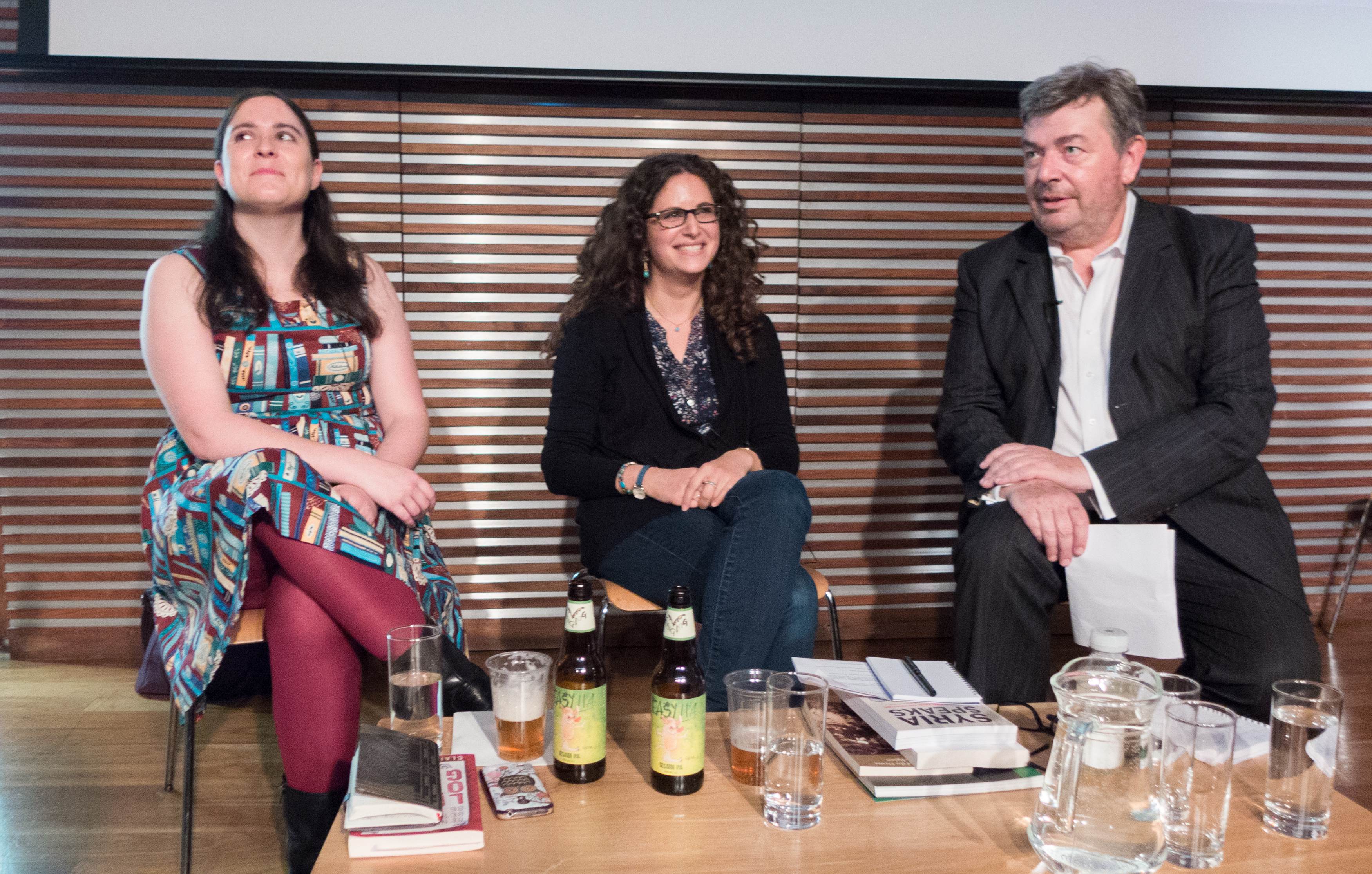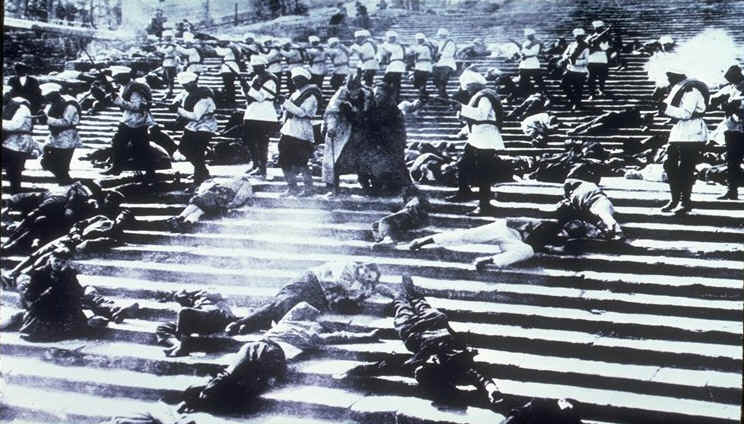28 Sep 2017 | Event Reports, News and features
Award-winning journalist David Aaronovitch was joined in conversation with Irish young adult author Claire Hennessy and Saqi Books publisher Lynn Gaspard. With Ege Dundar reading poems by Moris Farhi and Bidisha reading from her own poetry.
With readings by Moris Farhi and Bidisha.
Thank you to drinks sponsor Flying Dog Brewery and Free Word.
Part of Banned Books Week 2017.

Young adult author Claire Hennessy and Saqi Books publisher Lynn Gaspard joined journalist David Aaronovitch in conversation.
8 Aug 2017 | Artistic Freedom, Magazine, News and features, Russia, Volume 46.02 Summer 2017
[vc_row][vc_column][vc_custom_heading text=”Influential Soviet director Sergei Eisenstein is often portrayed as the godfather of propaganda in film. David Aaronovitch argues in the summer 2017 issue of Index on Censorship magazine that historical drama can also be manipulative when it ignores details of the past”][vc_row_inner][vc_column_inner][vc_column_text]

A still from Sergei Eisenstein’s 1925 film, Battleship Potemkin, portraying a massacre that never happened. Credit: Wikimedia
[/vc_column_text][/vc_column_inner][/vc_row_inner][/vc_column][/vc_row][vc_row][vc_column][vc_column_text]
My friend, a writer, reminded me of the English romantic poet John Keats’s axiom that “we hate poetry that has a palpable design upon us”. You could say, though, that Lenin and Mussolini – at least when it came to the poetry of film – knew differently. “Of all the arts, for us,” said Lenin, “the cinema is the most important”. “For us” meaning, of course, for the ruling Bolsheviks in the aftermath of the October 1917 revolution. When the Italian dictator Mussolini’s new super studios were opened in 1936 a sign was erected over the gate reading “Il cinema è l’arma più forte”, “cinema is the strongest weapon”.
It was George Orwell, not a dictator (though they doubtless would smilingly have agreed with him) who wrote that, “he who controls the past controls the future. He who controls the present controls the past.” It is pretty obvious that the way the powerful medium of film depicts the “then” has important implications for what people can be brought to believe about the “now”.
I was brought up partly on films made in the Soviet Union and saw some of the most celebrated early movies when I was young. The director Sergei Eisenstein was the most famous name and before I was 12 I’d seen almost all his films, from the silent Strike made in 1924 to the extraordinarily ambivalent and terrifying two-part classic Ivan the Terrible. Every single one of them can be said to have had some kind of agenda that dovetailed – sometimes perfectly, sometimes awkwardly – with that of the Soviet state.
[/vc_column_text][vc_row_inner][vc_column_inner width=”1/4″][vc_icon icon_fontawesome=”fa fa-quote-left” color=”custom” align=”right” custom_color=”#dd3333″][/vc_column_inner][vc_column_inner width=”3/4″][vc_custom_heading text=”The massacre on the Odessa steps (once seen, never forgotten) from the movie Potemkin didn’t actually happen” google_fonts=”font_family:Libre%20Baskerville%3Aregular%2Citalic%2C700|font_style:400%20italic%3A400%3Aitalic”][/vc_column_inner][/vc_row_inner][vc_column_text]
The two that were most obviously about Bolshevism and Russia were The Battleship Potemkin, dealing with events in the city of Odessa in 1905, and October, an account of the “ten days that shook the world” – the Bolshevik seizure of power – in Petrograd (St Petersburg) in 1917.
Both deploy Eisenstein’s famous techniques of intercutting, juxtaposition and montage to create mood and drama. Sometimes cutaways of objects or expressions are inserted to refer obliquely to what the viewer is supposed to think of the person or the moment being depicted.
And in both films the actual history is bent for the purposes of the filmmaker. The massacre on the Odessa steps (once seen, never forgotten) from the movie Potemkin didn’t actually happen. The film version of the storming of the Winter Palace in October involved many more actors than the actual event itself. And October was criticised in Keatsian terms by no less a luminary than Lenin’s widow, Nadezhda Konstantinovna Krupskaya.
The full article by David Aaronovitch is available with a print or online subscription.
[/vc_column_text][/vc_column][/vc_row][vc_row][vc_column][vc_custom_heading text=”Film and the Soviet state”][vc_column_text]
Sidebar by Margaret Flynn Sapia
[/vc_column_text][vc_video link=”https://www.youtube.com/watch?v=3UQMg3saU4Q&t=1s” title=”Strike (1925)”][vc_column_text]The Soviet version of Russian history had two goals: to legitimise the rise and rule of the current government, and to instil its values into future generations. Strike, the first film directed by Sergei Eisenstein, undoubtedly does both. The film, set before the revolution, tells the story of a group of factory workers as they rise up against their abusive management. It begins with a quote by Lenin – “The strength of the working class is organisation” – and ends with a violent strike cross cut with the slaughter of animals. From the first frame to the last, the message is clear.[/vc_column_text][vc_video link=”https://www.youtube.com/watch?v=JcJkHCihTmE” title=”Ivan the Terrible (1944)”][vc_column_text]It is fitting that Joseph Stalin regarded Tsar Ivan IV as his role model, given that the two men men are renowned as two of Russia’s cruelest and most feared leaders. Directed by Eisenstein and commissioned by Stalin himself, Ivan the Terrible takes a stab at telling Ivan’s story in a way that flatters the Stalin regime. The plot portrays the boyars, the highest of bourgeois aristocracy, as internal enemies seeking to undermine the singular strength of Ivan’s leadership, a less-than-subtle parallel for the one-party Soviet state of the 1940’s.[/vc_column_text][vc_video link=”https://www.youtube.com/watch?v=kS5kzTbNKjs” title=”Battleship Potemkin (1925)”][vc_column_text]Like a dozen other Soviet films, The Battleship Potemkin depicts the horrors of the tsarist regime and a subsequent popular revolt. It dramatises the true story of a 1905 mutiny by the crew on a Russian battleship, but its most famous and enduring scene, the massacre on the Odessa steps, was entirely invented. However, unlike many of its comrades, this movie was internationally celebrated for its technical excellence, and was ranked as the 11th best film of all time in a 2017 BFI critics poll. Through the film’s five acts, Eisenstein demonstrates that propaganda and art are not mutually exclusive, and that the confines of oppression can sometimes breed incredible creativity.[/vc_column_text][vc_video link=”https://www.youtube.com/watch?v=riOLSslKvxU” title=”October: 10 Days That Shook the World (1928)”][vc_column_text]A retelling of Russia’s 1917 Revolution, this film creates a fascinatingly skewed representation of the Soviet Union’s rise. While the series of major events in the film is historically accurate, the depictions of Soviet leaders and opposition give the film’s biases away, as key facets of character and decisions are highlighted and hidden. When watching the film, pay special attention to the portrayals of Lenin and the Bolsheviks. [/vc_column_text][vc_video link=”https://www.youtube.com/watch?v=R-QBqT9RQAM” title=”Panfilov’s 28 Men (2016)”][vc_column_text]Panfilov’s 28 Men demonstrates how Russian manipulation of history did not end with the Soviet Union. Released in 2016, this film is based on a famous but disputed incident in World War II wherein a small group of Russian soldiers purportedly warded off a wave of Nazi tanks and soldiers, all dying in the process. The events were heavily embellished by Soviet propagandists and later debunked, but the film based on them was partially funded by the Russian Ministry of Culture and is widely advertised as an accurate depiction of historical events. Times change, but the Russian regime continues to use cinema to its benefit.[/vc_column_text][/vc_column][/vc_row][vc_row][vc_column][vc_column_text]
This article is published in full in the Summer 2017 issue of Index on Censorship magazine. Print copies of the magazine are available on Amazon, or you can find information about print or digital subscriptions here. Copies are also available at the BFI, the Serpentine Gallery, MagCulture, (London), News from Nowhere (Liverpool), and Home (Manchester). Each magazine sale helps Index on Censorship continue its fight for free expression worldwide
[/vc_column_text][/vc_column][/vc_row][vc_row][vc_column][vc_custom_heading text=”From the Archives”][vc_row_inner][vc_column_inner width=”1/3″][vc_single_image image=”80560″ img_size=”213×289″ alignment=”center” onclick=”custom_link” link=”http://journals.sagepub.com/doi/pdf/10.1177/0306422014523227″][vc_custom_heading text=”Reel Drama: WWII propaganda” font_container=”tag:p|font_size:24|text_align:left” link=”url:http%3A%2F%2Fjournals.sagepub.com%2Fdoi%2Fpdf%2F10.1177%2F0306422014523227|||”][vc_column_text]March 2014
David Aaronovitch argues that all’s fair in war against fascist dictatorship, including seducing the United States into war with pretty faces and British accents.[/vc_column_text][/vc_column_inner][vc_column_inner width=”1/3″][vc_single_image image=”89184″ img_size=”213×289″ alignment=”center” onclick=”custom_link” link=”http://journals.sagepub.com/doi/pdf/10.1080/03064220512331339706″][vc_custom_heading text=”The ferghana canal” font_container=”tag:p|font_size:24|text_align:left” link=”url:http%3A%2F%2Fjournals.sagepub.com%2Fdoi%2Fpdf%2F10.1080%2F03064220512331339706|||”][vc_column_text]February 2005
The first 145 shots of a shooting-script by Sergei Eistenstein, a prologue to the modern drama of Uzbekistan’s reclamation of its desert wastes.[/vc_column_text][/vc_column_inner][vc_column_inner width=”1/3″][vc_single_image image=”98486″ img_size=”213×289″ alignment=”center” onclick=”custom_link” link=”http://journals.sagepub.com/doi/pdf/10.1080/03064229108535073″][vc_custom_heading text=”Iron fist, silver screen” font_container=”tag:p|font_size:24|text_align:left” link=”url:http%3A%2F%2Fjournals.sagepub.com%2Fdoi%2Fpdf%2F10.1080%2F03064229108535073|||”][vc_column_text]March 1991
An examination of how film is an arm of party propaganda in Saddam Hussein’s Iraq, highlighting the 1973 Law on Censorship of Foreign Films.[/vc_column_text][/vc_column_inner][/vc_row_inner][vc_separator][vc_row_inner][vc_column_inner width=”1/3″][vc_custom_heading text=”100 Years On” font_container=”tag:p|font_size:24|text_align:left” link=”url:https%3A%2F%2Fwww.indexoncensorship.org%2F2017%2F06%2F100-years-on%2F|||”][vc_column_text]Through a range of in-depth reporting, interviews and illustrations, the summer 2017 issue of Index on Censorship magazine explores how the consequences of the 1917 Russian Revolution still affect freedoms today, in Russia and around the world.
With: Andrei Arkhangelsky, BG Muhn, Nina Khrushcheva[/vc_column_text][/vc_column_inner][vc_column_inner width=”1/3″][vc_single_image image=”91220″ img_size=”medium” alignment=”center” onclick=”custom_link” link=”https://www.indexoncensorship.org/2017/06/100-years-on/”][/vc_column_inner][vc_column_inner width=”1/3″][vc_custom_heading text=”Subscribe” font_container=”tag:p|font_size:24|text_align:left” link=”url:https%3A%2F%2Fwww.indexoncensorship.org%2Fsubscribe%2F|||”][vc_column_text]In print, online. In your mailbox, on your iPad.
Subscription options from £18 or just £1.49 in the App Store for a digital issue.
Every subscriber helps support Index on Censorship’s projects around the world.
 SUBSCRIBE NOW[/vc_column_text][/vc_column_inner][/vc_row_inner][/vc_column][/vc_row]
SUBSCRIBE NOW[/vc_column_text][/vc_column_inner][/vc_row_inner][/vc_column][/vc_row]
7 Aug 2017 | Events
[vc_row][vc_column][vc_column_text]
Join Index on Censorship, Free Word Centre and Islington Library and Heritage Services as we celebrate our freedom to read as part of Banned Books Week.
Every day, across the globe, writers are being censored in a hundred different ways. Some face persecution, others are imprisoned, some have their work banned and some are subject to more insidious means of censorship.
So, who are the modern-day censors? And what ingenious evasions – both modern and ancient – have writers and publishers used to protect our right to read?
Join award-winning journalist David Aaronovitch in conversation with Irish author Claire Hennessy and publisher Lynn Gaspard, as they explore what happens when ideas are silenced.
With readings by Moris Farhi and Bidisha.
The event will be followed by free drinks courtesy of Flying Dog Brewery and Index on Censorship.
Part of Banned Books Week 2017. Presented by Free Word and Index on Censorship in partnership with Islington Library and Heritage Services[/vc_column_text][vc_column_text]Speakers:[/vc_column_text][vc_row_inner][vc_column_inner width=”1/3″][vc_single_image image=”95061″ img_size=”full” alignment=”center”][vc_column_text]David Aaronovitch is an award-winning journalist, broadcaster and author and chair of free expression organisation Index on Censorship. He is a regular columnist for The Times newspaper.[/vc_column_text][/vc_column_inner][vc_column_inner width=”1/3″][vc_single_image image=”95058″ img_size=”200×200″ alignment=”center”][vc_column_text]Claire Hennessy is the Irish author of several young adult novels that boldly tackle many complex issues for young people. She has written about anorexia and, most recently in her new book Like Other Girls, Ireland’s archaic abortion laws and queer culture.[/vc_column_text][/vc_column_inner][vc_column_inner width=”1/3″][vc_single_image image=”95059″ img_size=”200×200″ alignment=”center”][vc_column_text]Lynn Gaspard is the Publisher of Saqi Books, who claim a history rather more dramatic than most bookshops or publishing houses: obstacles over the years have included wars, censorship, political instability and export embargoes.[/vc_column_text][/vc_column_inner][/vc_row_inner][vc_column_text]Readings:[/vc_column_text][vc_row_inner][vc_column_inner width=”1/4″][vc_single_image image=”95062″ img_size=”200×200″ alignment=”center”][/vc_column_inner][vc_column_inner width=”3/4″][vc_column_text]Moris Farhi is a Turkish novelist and essayist who for over twenty-five years has campaigned for writers persecuted and imprisoned by repressive regimes. In 2001 he was elected a Vice President of International PEN. In the same year he was appointed an (MBE) for services to literature.[/vc_column_text][/vc_column_inner][/vc_row_inner][vc_row_inner][vc_column_inner width=”1/4″][vc_single_image image=”95425″ img_size=”200×200″ alignment=”center”][/vc_column_inner][vc_column_inner width=”3/4″][vc_column_text]Bidisha is a British newspaper journalist, critic and broadcaster/presenter for the BBC, Channel 4 and Sky. She specialises in international human rights, social justice, gender and the arts and is a trustee of the Booker Prize Foundation. Her most recent book, Asylum and Exile: Hidden Voices of London, is based on her outreach work, most recently with young asylum seeker mothers[/vc_column_text][/vc_column_inner][/vc_row_inner][/vc_column][/vc_row][vc_row][vc_column][vc_column_text]
[/vc_column_text][/vc_column][/vc_row][vc_row][vc_column][vc_basic_grid post_type=”post” max_items=”4″ element_width=”6″ grid_id=”vc_gid:1504267800522-bc1f7362-e99f-2″ taxonomies=”5844″][/vc_column][/vc_row]
23 Jun 2017 | Event Reports, Mapping Media Freedom, News and features
[vc_row][vc_column][vc_video link=”https://www.youtube.com/watch?v=IiBVfpI05Z0″][vc_column_text]Index on Censorship officially launched its Mapping Media Freedom platform at the London residence of Swedish Ambassador Torbjörn Sohlström on Wednesday 22 June.
Mapping Media Freedom is a database tracking threats and violations against press freedom across 42 European countries. The data is mapped to help raise awareness of the pressure journalists face as they do their jobs and help officials to take action to protect press freedom across Europe.
The event attracted journalists and internet rights activists to representatives from organisations devoted to freedom of expression, who were welcomed to the launch by Sohlström had received a special invitation from the ambassador.
Melody Patry, Index on Censorship’s head of advocacy, introduced the MMF tool and reminded the audience of why this project is necessary. She quizzed the audience on headlines mapped during the last month, asking them to guess which country offences took place in. Patry said that these offences take place throughout Europe, not just in countries with authoritarian governments. “It’s a way of highlighting problems, it’s a way of bringing people into the conversation,” Ambassador Sohlström said about the new tool.
Chair of Index on Censorship and Times columnist David Aaronovitch, who participated in a panel discussion with fellow journalists, former head of Swedish Pen Ola Larsmo and Director of BBC World Service Group Francesca Unsworth, said that the media are facing a crisis of authority. “Both everybody and nobody can be believed.” According to Aaronovitch, this state of authority crisis tends to create a demand for new forms of censorship and problems journalists.
The journalists participated in a discussion, chaired by Index on Censorship CEO Jodie Ginsberg, that examined threats against journalists, hate speech and internet censorship. Unsworth suggested that the world is becoming more authoritarian regarding free speech rights, while Larsmo added that rights were generally moving in a “three steps forward, two steps back,” pattern, and we are living in a moment of retreat.
“People crave the kind of impartial journalism offered by mainstream media,” Unsworth said, noting that there is still a role for journalists.
Larsmo emphasised that common people should understand that their freedom is linked to freedom of the press and freedom of expression.
With thanks to Edwardian Hotels London[/vc_column_text][/vc_column][/vc_row][vc_row][vc_column][vc_basic_grid post_type=”post” max_items=”12″ style=”load-more” items_per_page=”4″ element_width=”6″ grid_id=”vc_gid:1498211658950-6ccf6854-da7e-3″ taxonomies=”6564″][/vc_column][/vc_row]



